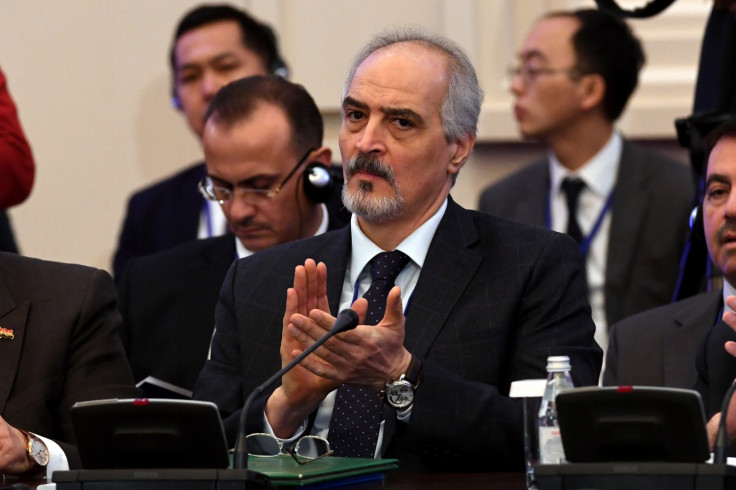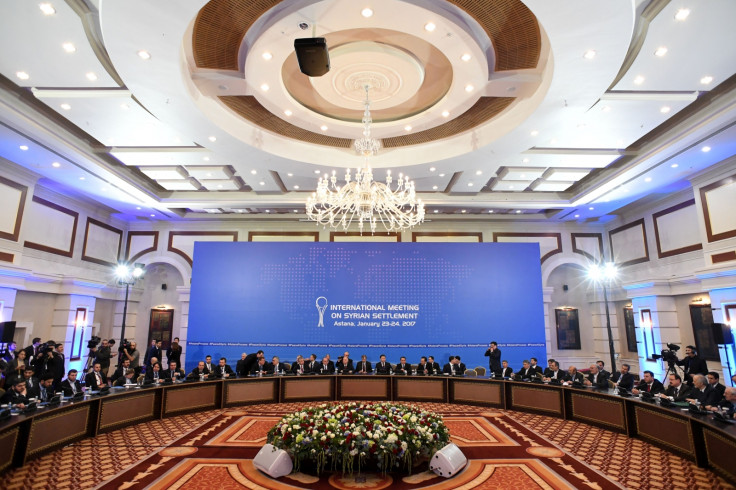Syrian peace talks off to rocky start as government accuse opposition of 'torpedoing' negotiations
Syria's top negotiator Bashar Jaafari said opposition groups went outside agreed frameworks.

Peace talks on the six-year Syrian conflict, which opened in the Kazakh capital of Astana on Monday (23 January), have got off to a rocky start after the Syrian delegation accused the opposition of trying to "torpedo" the talks.
In a press conference after the talks adjourned for the day, Syria's top negotiator, Bashar Jaafari, said his counterpart Mohammed Alloush had acted in a way "removed from diplomacy" by going outside the framework agreed for the talks.
The negotiations have been arranged by Turkey, Russia and Iran, who will act as guarantors for any agreement and will aim to build on the ceasefire that has been in place since 30 December 2016.
Jaafari said: "We came to Astana, as you know, to fulfil and implement the provisions of the agreement reached by the three guarantors on the 29th of December, 2016.
"This is, mainly speaking, why we came to Astana and this is what the meeting in Astana is about.
"We should be acting on the basis of these agreements. This is, after all, the whole framework for Astana. Astana has its own specific framework and we are here to implement this framework.
"Some of the participants, and namely speaking, the delegation of the terrorist armed groups, gave [their] own interpretation or its own misinterpretation of these agreements and went beyond the framework of these agreements, and that created a problem for all the participants because they did not respect the provisions of the agreement, on the basis of which we came to Astana."
When asked by reporters to clarify how the armed opposition groups went beyond the framework of the Astana talks, Jaafari discussed the situation in the Wadi Barada valley as an example.
The Wadi Barada valley, located 18km (11 miles) outside of Damascus, controls the capital's water treatment facilities and is responsible for providing all of the city's water supplies.
Over 5.5 million people in Damascus have been without water since 27 December as the water facilities have been sabotaged.
Syria's government has waged a heavy bombing campaign in the area to drive out groups such as Al Nusra Front, who it claims contaminated the water with diesel.
Jaafari said the opposition delegation at Astana tried to defend the Al Nusra Front, who are not party to the ceasefire, therefore going outside the agreed format of the talks.
Syria’s UN envoy Bashar Ja’afari makes statement after taking part in Astana talks on Syria
Posted by Press TV on Monday, January 23, 2017
Despite the first-day snags, Jaafari said the Syrian government is still optimistic of achieving peace at the Astana talks.
He said: "We came to Astana to succeed. We will not be part of any manoeuvre aimed at torpedoing the meeting of Astana."
Despite the disagreement between Syria's government and opposition groups, analysts expect the real crux of any agreement to emerge from trilateral talks between Turkey, Russia and Iran.
Noah Bonsey, a Syria analyst with the International Crisis Group, told Al Jazeera: "Between Turkey, Russia and Iran you have tremendous leverage and military weight on the ground in Syria. If they make progress in adjusting the ceasefire that has already been agreed ... that could have major military ramifications."
The Astana talks are due to continue on Tuesday (24 January).

© Copyright IBTimes 2025. All rights reserved.






















